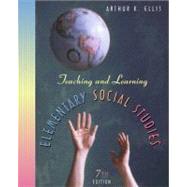
1. Ideas, Definitions, and Trends.
Social Studies Defined.
The Social Studies Curriculum.
Classroom Environments.
The Constructivist Environment for Learning.
Higher-Level Thinking.
A Good Social Studies Teacher.
2. Building the Foundations for Social Studies.
Research Findings that You Ought to Know About.
Children's Natural Tendencies.
Characteristics of Higher Achieving Students.
Encouraging Thoughtfulness.
3. The Knowledge Base for Elementary Social Studies.
The Nature of Knowledge.
The National Council for the Social Studies Standards as a Guide to the Knowledge Base.
The Social Science Disciplines.
4. Theory: Developmental and Psychological Dimensions.
Jerome Bruner.
Lev Vygotsky.
Carl Rogers.
5. Experience, Constructivism, and Reflective Thinking.
Contrasting Perspectives for Social Studies.
The Emotional/Intellectual Landscape.
6. Planning for Learning.
The Teacher as a Decision Maker.
Teaching Concepts.
Teaching Skills.
Teaching Values.
How to Develop a Unit: The Design.
Instructional Design and Development: Steps and Elements.
A Sample Unit: Archeology.
7. Teaching and Learning Strategies.
Student Perceptions of Social Studies.
Direct Instruction.
Indirect Instruction.
8. Assessing Student Progress.
Assessment: An Overview.
Assessing Assessment.
Tests.
Assessing Your Own Effectiveness.
9. Inquiry and Discovery: Children as Researchers.
Inquiry and Discovery Learning.
Historical Research.
Descriptive Research.
Survey Research.
Experimental Research.
10. Teaching and Learning Responsible Citizenship.
What are the Roles of the Citizen in American Democracy?
The Role of Social Knowledge.
Decision Making: Classroom Civics Lessons.
The Research Base.
The Meaning of Citizenship.
11. Teaching Values, Character Education, and Moral Development.
A Values Perspective.
The Moral Life of Schools.
Teaching Values.
Character Education.
Values Realization.
Moral Development.
Children's Values.
12. Making and Interpreting Maps.
Strategies for Making and Interpreting Maps.
13. Social Studies and Curriculum Integration.
Projects and Themes for Learning.
The Nature of Interdisciplinary Projects.
Kinds of Projects.
A Sample Interdisciplinary Project. Constructing a Greenbelt.
Significant Themes for Integration.
14. Social Studies and Literacy.
Traveling Down Memory Lane.
Becoming a Reader.
Writing and Social Studies.
Social Studies and Language Development.
The Spoken Word.
Electronic Literacy.
15. Social Studies and Current Events.
A Current Events Discussion.
Criteria for Successful Current Events Sessions.
Focusing on Students' Interests.
Electronic Current Events.
Current Events Strategies.
A Current Events Mini Unit.
16. Cooperative Environments: The Hidden Curriculum.
Three Goal Structures for Social Studies.
Grouping.
Role-Play Example: Westward Expansion.
The Physical Environment.
Epilogue.
Index.
The New copy of this book will include any supplemental materials advertised. Please check the title of the book to determine if it should include any access cards, study guides, lab manuals, CDs, etc.
The Used, Rental and eBook copies of this book are not guaranteed to include any supplemental materials. Typically, only the book itself is included. This is true even if the title states it includes any access cards, study guides, lab manuals, CDs, etc.